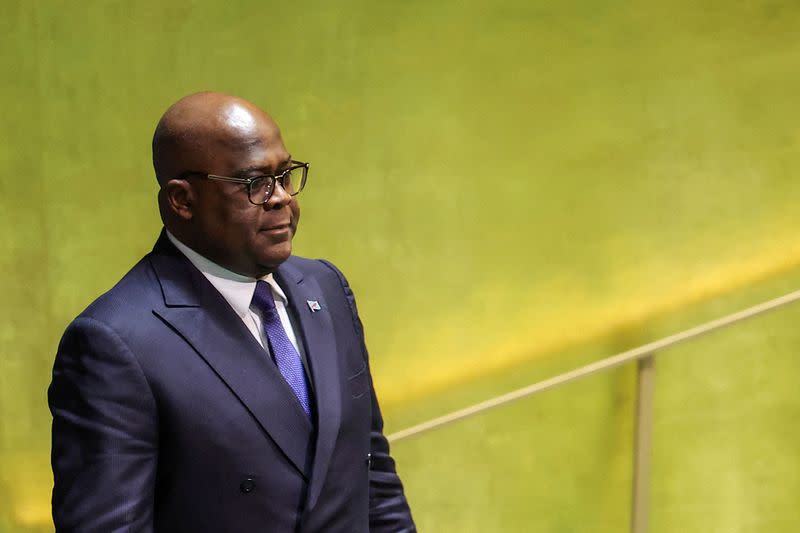Congo presidency's rights record raises questions ahead of vote

- Oops!Something went wrong.Please try again later.
By Ange Kasongo and Sonia Rolley
KINSHASA (Reuters) - When Felix Tshisekedi took office as president of the Democratic Republic of Congo following a disputed election in 2018, he promised to end decades of political repression and corruption that had stifled development in the Central African country.
But as he prepares for a re-election bid in December, rights groups, international allies and rivals accuse his administration of stifling dissent just as previous government's did while he was in opposition.
In recent months, soldiers gunned down anti-U.N. protesters in the eastern city of Goma, and the body of a prominent opposition lawmaker was found in his car. Police have dispersed opposition rallies with tear gas, and at least two journalists have been detained on allegations of spreading fake news.
Freedom of expression and freedom of the press are being "severely tested" in Congo, said Jean-Claude Katende, president of the African Association for the Defence of Human Rights (ASADHO).
"Violation of these freedoms will lead to social and political violence and contestation of the results," he told Reuters, referring to potential fallout from the elections to be held on Dec. 20.
Patrick Muyaya, Congo's communication minister and government spokesperson, and Tina Salama, the president's spokesperson, both denied accusations that rights and liberties were being curbed in Congo. They did not address the possibility of violence during the electoral period.
Tshisekedi will face a field of opposition candidates that includes Martin Fayulu, whose claim that he won the 2018 presidential election led to post-electoral friction, and Nobel Peace Prize-winning gynaecologist Denis Mukwege.
Still, a disputed election could further destabilise a country already struggling to contain a myriad of armed groups and a rebellion.
Ida Sawyer, crisis and conflict director at Human Rights Watch, said many Congolese had hoped Tshisekedi's presidency would mark the end of years of repression and the culture of impunity that characterised the government of former President Joseph Kabila.
"Yet as Tshisekedi nears the end of his first term, we see many of the same abusive tactics," she told Reuters. Security forces are "once again being used to suppress dissent".
At least 56 civilians were killed in Goma on Aug. 30, according to the military prosecutor, when soldiers opened fire on demonstrators who were gathering to protest against the presence of U.N. peacekeepers and other foreign forces.
A Congolese colonel has been found guilty of murder and other crimes related to the killings. Three other soldiers were sentenced to 10 years in jail, while two others were acquitted.
The prosecutor handling the case said they were acting in isolation, and described the killings as "not a state action".
Their lawyer Serge Lukanga, told Reuters he will appeal the sentence. He denied the charges and said they did not give an order to open fire nor open fire themselves, and all they did that day was carry out they mission as Republican Guards.
"The president has condemned in the strongest possible terms the abuses committed by the security forces in Goma and elsewhere, stating that these acts and crimes will not go unpunished," Salama said.
"I AM NOT A DICTATOR"
Congo is the world's top supplier of cobalt, used in making batteries in electric vehicles, and its third-biggest copper producer. It is not clear if the political problems will have a direct impact on foreign investment.
Chinese and other commodities investors continue to pour in billions, particularly in copper and cobalt projects. The government is currently renegotiating terms with China over a 2008 infrastructure-for-minerals-deal
The United States has expressed concern about reports of attacks on political figures, harassment of opposition supporters, politicised judicial proceedings and arbitrary detentions.
In the preceding months, the bullet-riddled body of former transport minister and opposition lawmaker Cherubin Okende was found in his car, and opposition protests over alleged irregularities in voter registration led to clashes with police.
In September, presidential candidate and one-time Tshisekedi ally Jean-Marc Kabund was sentenced to seven years in prison for spreading false rumours and insulting the head of state, after he called Tshisekedi a "danger" and lambasted his government in a speech. He says the charges were politically motivated.
Government spokesperson Muyaya said the various incidents could not be interpreted as signs that there is a climate of repression in Congo.
Rights groups say independent media are also facing increased threats. They say a particular red flag is a new press law and digital code, enacted in April, that means journalists face potential prison time for sharing information deemed false.
Stanis Bujakera, who works for several media outlets, including Reuters, has been held since Sept. 8 on suspicion of spreading false information about Okende's killing in an article published by Jeune Afrique. The French news magazine has said the article did not carry Bujakera's name, and "he cannot be held responsible" for its content.
Tshisekedi has said it would not be appropriate for him to comment on judicial affairs and told journalists in September he is "a great supporter of press freedom".
In a speech to Congo's diaspora representatives in Belgium he said his political future faced unnamed external and internal threats that had to be defeated.
"If I am not re-elected, it is the enemies of the DRC who will take over, with the complicity of some who say they are one of us," he said in a video shared online.
"I am not a dictator, I am not bloodthirsty, but to defend my people, our dignity, I am ready for anything."
(Ange Kasongo reported from Kinshasa and Sonia Rolley from Paris; Additional reporting by Arlette Bashizi in Goma; Writing by Alessandra Prentice; Editing by Bate Felix and Angus MacSwan)

